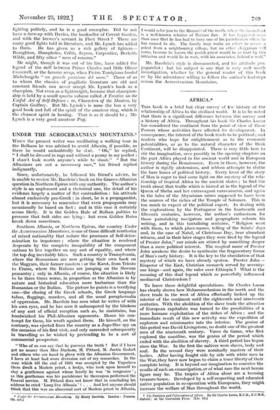AFRICA.*
This book is a brief but clear survey of the history of the relationship of Africa to the civilized world. It is to be noted that there is a significant difference between this survey and a history of Africa. Throughout his book Sir Charles Lucas has considered the continent from the point of view of those Powers whose activities have affected its development. In consequence, the interest of the book tends to be political ; and readers who hope for enlightenment as to the economic potentialities, or as to the natural character of the Dark Continent, will be disappointed. There is very little here to stir the imagination, save possibly in the opening chapters on the part Africa played in the ancient world and in European history during the Renaissance. Even in those, however, the author is rigidly abstemious, and seldom attempts to clothe the bare bones of political history. Every lover of the story of Man is eager to find some light on the mystery of the rela- tionship of tropical Africa to the ancient states ; to find the truth about that traffic which is hinted at in the legend of the Queen of Sheba and her extravagant caravanserai, and again in the tales of the Abyssinian mines supposed to have been the sources of the riches of the Temple of Solomon. This is too much to expect of the political expert. In dealing with the explorations by the Portuguese in the fourteenth and fifteenth centuries, however, the author's enthusiasm for those painstaking navigators and geographers colours his writing, and in this tantalizing sentence, " Religion went with them, to which place-names, telling of the Saints' days and, in the case of Natal, of Christmas Day, bear abundant witness, and in their later stages they were fired by the legend of Prester John," our minds are stirred by something deeper than a mere political interest. The magical name of Prester John awakens the desire to synthesize the fragmentary forms of Man's early history. It is the key to the elucidation of that mystery of which we have already spoken. Prester John— Emperor of the East, Christian monarch served by seventy- one kings—and again, the ruler over Ethiopia ? What is the meaning of this dual legend which so powerfully influenced mediaeval Christendom ?
To leave these delightful speculations. Sir Charles Lucas has clearly shown how Mohammedanism in the north and the slave trade in the west of Africa effectually locked up the interior of the continent until the eighteenth and nineteenth centuries. With the abolition of the slave trade the attention of European capitalists was turned to the possibilities of a more humane exploitation of the riches of Africa ; and the immediate result of this new activity was the expedition of explorers and missionaries into the interior. The genius of this period was David Livingstone, no doubt one of the greatest men of the nineteenth century. Vasco da Gams, who first explored the coastline, was the genius of the period which ended with the abolition of slavery. A third period has begun since the War. In the first the natives were slaves, body and soul. In the second they were nominally masters of their bodies. After having fought side by side with white men in the War, they have now begun to claim a truer liberty of their complete being. It is beyond our imagination to conceive the results of such an emancipation, or of what race the next heroic figure may be. The tropics of Africa alone are a teeming treasure-house. Developed by a self-respecting and educated native population in co-operation with Europeans, they might increase the welfare of Man throughout the world.
• The Partition and Colonisation of Africa. By Sir Charles Lucas, ILC.B., 11.C.XG, Oxford: at the Clarendon Press. [lb. 0d4










































 Previous page
Previous page